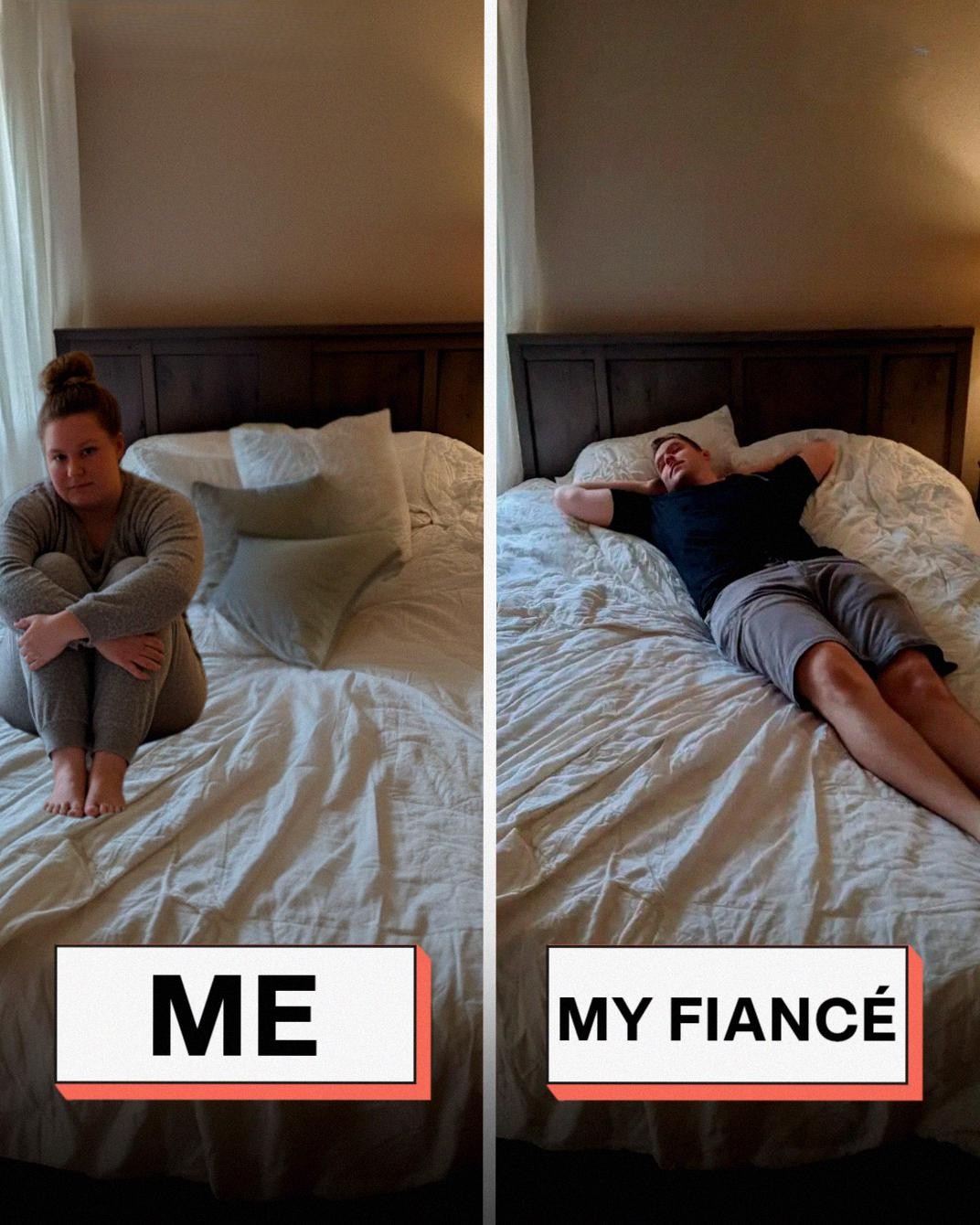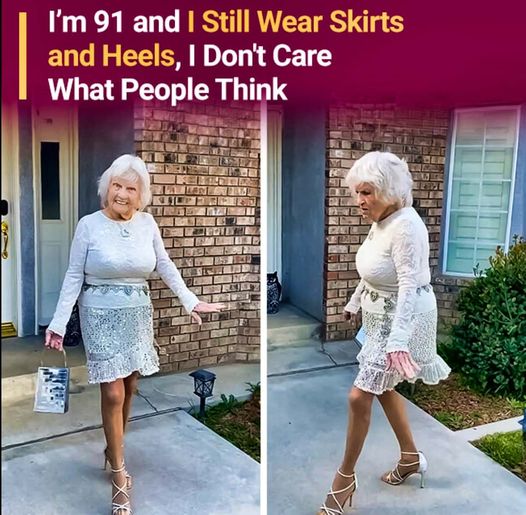When Mark and I first moved in together, we sat at the rickety little kitchen table in our new apartment and made a pact: everything would be split 50-50.
Rent, groceries, Wi-Fi, streaming subscriptions, furniture—if it went into the home, we both paid for it. It felt mature. Responsible. Equal. We weren’t married yet, and we both liked feeling independent, like two whole people choosing to build a life together instead of melting into one.
I used to love that about us. The clean logic of it. No one owed anyone. No one carried more.
That illusion lasted until the bed broke.
It was a hand-me-down from the previous tenants, old and loud, the kind of mattress that groaned every time you shifted. One night, the inevitable happened. There was a loud crack, the slats gave way, and the whole thing caved in. We dropped straight to the floor in a mess of sheets and limbs.
I burst out laughing, sprawled on my back, staring at the ceiling. The whole thing was so ridiculous.
Mark didn’t laugh.
He rolled over, groaning dramatically, then looked down at the broken frame beneath us.
“Honestly, Erin,” he said, with a sharpness that cut through the humor, “this thing probably couldn’t handle your weight anymore.”
For a second, I honestly thought I misheard him. My laughter died in my throat. He wasn’t smiling.
The next morning, I tried to file it away as “a bad joke.” I sat cross-legged on the couch in my oversized hoodie, laptop balanced on my knees, scrolling through bed frames and mattresses. My leg ached faintly in the cold—the same leg I broke a few months back when I fell down the stairs trying to help him move a desk.
“We need a new bed,” I said, not looking up. “I found a queen frame and a hybrid mattress. Good reviews. Medium firm. The whole thing is around $1,400.”
“Yeah, sure,” Mark said from his spot, sprawled on the opposite end of the couch, phone in hand. “Whatever you think.”
So I ordered it. It was easier to just put it on my card and sort the split later. I forwarded him the receipt and called into the kitchen while I rinsed my mug.
“Hey, just Venmo me your half when you get a chance, okay? Seven hundred.”
A moment later he walked in, leaning on the counter like this was some casual chat.
“Half?” he repeated. “Why half?”
I frowned. “Because that’s how we do things? It’s our bed.”
He pulled that little smirk he wears when he thinks he’s clever.
“I mean, let’s be real, Erin. You take up more of the bed than I do.”
I blinked. “What’s that supposed to mean?”
“You’ve put on some weight,” he said, in that lazy, matter-of-fact tone. “You’ve got more… surface area now. You probably use more of the mattress. Seventy-thirty seems more accurate, don’t you think? You should pay more.”
My fingers tightened around the sponge.
“You’re joking,” I said, even though I already knew he wasn’t.
He gave a little half-laugh. “It’s kind of a joke. But like… not totally. You’re the one always going on about fairness. Equal based on use, right? Plus you’ll wear out the foam faster.”
“So because I gained weight while I was recovering from a broken leg—which, as a reminder, I broke trying to help you—you think I should pay more for our bed?”
“Babe,” he said, rolling his eyes, “don’t be so sensitive. It’s just a joke. You never used to be like this.”
My humiliation sat in my throat like a stone.
“It doesn’t sound like a joke,” I forced out. “It sounds like you’re being… cruel.”
He shrugged, already looking back at his phone. “You just don’t get my sense of humor anymore.”
That was the thing—this wasn’t new. Ever since my accident, he’d been slipping comments into almost every day.
“Guess I’m dating the comfier version of you now.”
“At least I won’t freeze at night. Built-in space heater.”
“Don’t sit on my lap, Erin, I actually like having working knees.”
“Careful, you’ll tilt the bed again.”
Each one landed like a paper cut. Tiny. Easy to dismiss. But they still stung, and the sting never really disappeared; it just layered over itself until I couldn’t tell where one ended and the next began.
Now, as he smirked over his coffee and declared it all “just math,” something inside me quietly clicked into place.
“Equal based on use,” I repeated, my voice neutral.
He nodded, satisfied. “Exactly. Finally, you see it.”
I didn’t argue. I didn’t cry. I just met his eyes, gave a small, thoughtful nod, and let the conversation die.
He took that as a win.
I took it as a starting point.
Four days later, while he was at work, the new bed arrived. Two delivery guys carried the frame and mattress in, set it all up, and left me standing alone in the doorway of our bedroom.
It really was beautiful. Solid dark wood. Clean headboard. New mattress that didn’t sag or complain when I pressed my hand into it. Fresh bedding in soft clay tones that made the room feel peaceful.
I stood there for a long minute, then went to the hall closet and pulled out painter’s tape and a measuring tape.
If I was paying for 70% of it, I decided, I’d take 70% of the space.
I measured the width of the mattress, did the math, and taped off a clean, bright blue line about a third of the way in from the right side—his side. I stripped the sheets I’d just put on, laid them flat, and carefully sliced them down the same line. Comforter too.
When I remade the bed, my side was layered, soft, and warm—fitted sheet snug, duvet fluffed, pillows stacked. His side had a lonely strip of fitted sheet, a thin pillow, and the scratchy throw blanket from the back of the couch.
By the time I stepped back, the bed looked like a before-and-after photo split down the middle.
That evening, Mark came home, tossed his keys on the counter, and kissed the top of my head without really looking at me.
“Smells amazing,” he said, sniffing the air. “Did you make fried chicken? Oh my God, I love you.”
I didn’t respond. I just wiped my hands on a towel and said, “Bedroom first. Then dinner.”
He frowned, confused, but padded down the hallway anyway. A second later, his footsteps stopped.
“What the—Erin! What happened to the bed?!”
I leaned against the doorframe and folded my arms, keeping my voice light.
“Oh, good, you noticed,” I said. “Since I’m paying for 70% of it, I figured I should actually have 70% of the space. Your thirty percent is right there.”
He spun to face me. “You’re kidding.”
“No. I’m just making sure things are… fair. Equal based on use, remember? Your words. I’m just applying your logic.”
He grabbed at the comforter, trying to yank it over to his side, but it stopped halfway, stuck at the seam I’d stitched down. When he tugged harder, there was a loud rip, and he ended up holding half a duvet in his hands like a deflated trophy.
“Seriously?” he shouted. “This is insane, Erin.”
“What’s insane,” I said calmly, “is thinking you get to insult my body and still sleep comfortably in a bed I mostly paid for.”
That night, he tried to curl himself into his narrow slice of mattress, back to the blue tape, wrapped in his scratchy throw. I fell asleep quickly on my side, my leg propped with a pillow, my body relaxed for the first time in days.
In the morning, I woke up feeling rested. He looked wrecked.
“I was joking,” he muttered as he poured coffee. “You know that, right?”
I sat at the table, fingers wrapped around my mug, and considered him.
“No,” I said. “You weren’t.”
He huffed. “You’re taking this way too far. It was one comment.”
I raised an eyebrow. “It wasn’t one comment. It’s been a pattern. For months. And you didn’t care if it hurt me.”
“You’re too sensitive,” he snapped. “I can’t say anything anymore. I’m walking on eggshells in my own home.”
I felt that familiar urge to smooth things over rise in my chest—the urge to say, “You’re right, I overreacted,” just to end the discomfort.
This time, I let the discomfort sit.
“Maybe,” I said quietly, “you’re just not used to being held accountable.”
He scoffed, leaning back. “So what now, Erin? You punish me with a bed border forever? Is that the plan?”
I took a deep breath.
“No,” I said. “That’s not the plan.”
Later that day, after he left for work, I pulled out our drawer of paperwork: lease agreement, shared bills, old receipts I’d kept “just in case.” I sat at the kitchen table with a notepad and a pen, and I started adding.
Not with rage. With clarity.
Every time I’d paid rent and he’d been “short this month” and promised to make up for it later. The weekend away I’d covered entirely because he “forgot his card.” The utilities I’d quietly paid when he was between jobs. The new couch I’d bought because he loved it but said, “Let’s just say that one’s yours.”
Line by line, I totaled it. All the things that were supposed to be fifty-fifty but never quite were.
At the bottom of the list, I wrote in neat letters:
BED – $1,400
Mark’s share (30%): $420
Then I subtracted it from the total.
When I was done, I slipped the page into a manila envelope, added a sticky note with a date two weeks out, and wrote his name on the front.
That evening, after dinner, while he was scrolling on his phone, I slid the envelope across the table.
“What’s this?” he asked.
“It’s everything you owe me,” I said. “From the last year. Every time I covered more than half.”
He pulled out the paper, scanned it, and scoffed.
“Oh, come on, Erin. You’re seriously itemizing our relationship now?”
“I’m itemizing our finances,” I said. “The thing you insisted we keep perfectly fair. This is just me taking you at your word. There’s your total. I want you out by Sunday.”
He stared at me, stunned.
“You’re breaking up with me over a bed?”
“No,” I said, meeting his eyes steadily. “I’m breaking up with you over the fact that you turned me into a joke in my own home, over and over, and felt entitled to do it. The bed just made it impossible to ignore.”
He laughed once, a brittle sound. “You’ll regret this. Nobody else is going to put up with your drama.”
“I’m counting on that,” I said. “Because I’m done being someone you ‘put up with.’”
He moved out that weekend. No grand gesture. No last-minute apology at the door. He left the key on the counter, took his things, and sent one text an hour later.
Good luck, Erin.
I read it once and deleted it.
A week later, my friend Casey sent me a photo from a party. In the background was Mark, sitting on a half-inflated air mattress on the floor of a mostly empty room, holding a solo cup.
Caption: “Looks like he really did downgrade to 30%.”
I smiled, shook my head, and deleted that too. I didn’t need to keep souvenirs of someone else’s consequences.
Instead, I made an appointment with a therapist.
I sat in a small, quiet office and told her how I’d started laughing off little digs years ago because it was easier than dealing with conflict. How “I’m just joking” was a phrase that made my stomach twist. How I kept trying to be the easygoing one, the “cool fiancée,” the one who “didn’t take things personally,” even when they were very clearly personal.
“You don’t have to shrink yourself to deserve love,” she said gently. “Or to keep it.”
That sentence sat with me for days.
As my leg finished healing, I started walking more. First around the block. Then around the park. Then up a hill that overlooked the city. One afternoon, as I stood at the top of the trail, wind in my hair and my breath coming in hard, steady pulls, I realized I hadn’t thought about my weight once.
I had thought about how strong my leg felt.
I got a haircut. Not a dramatic chop, just enough to feel lighter and intentional. I bought clothes that fit the body I had, not the one I was waiting to “get back.” I stopped pinching my stomach in the mirror. I stopped calling myself “gross” out loud, even as a joke.
I cooked fried chicken again just for me. Ate it on the couch with a movie and a glass of wine, my feet propped up on my own coffee table, my own bed waiting for me in the next room—exactly as spacious and comfortable as I wanted it to be.
At brunch, my friend Maya looked at me for a long moment and said, “You look… different. Good different.”
“I feel different,” I said. “Like I finally moved back into my own life.”
Because that was the lesson, really.
It was never about the bed. It was about the line I finally drew—not in painter’s tape across a mattress, but inside myself.
What I will accept.
What I won’t.
What “fair” actually means when love is real.
And I decided that in any future home I build—with or without someone else—I’ll share the bed, the bills, the space, the life.
But I will never again share my life with someone who thinks my body, my pain, or my presence is a punchline they’re entitled to.
The math is simple now.
My peace comes first.



